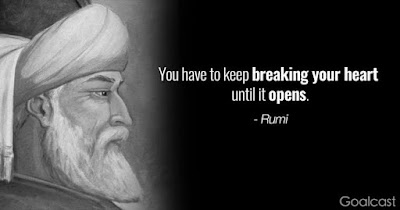Why is Rumi still the most read poet in America today?
Hundreds of years after his death, Rumi's work is still read, recited, sung with music, and inspired by novels, poems, music, and film, but Why is his word still so popular?
 |
| Rumi |
Millions of copies of medieval Persian Sufi poet Jalaluddin Muhammad Rumi's poetry have been sold and are being sold in the United States and around the world over the years. He was born 813 years ago in the year 1207 and even today there is no shortage of his fans all over the world.
Brady Gooch, author of Rumi's autobiography, Secrets of Rumi, says that "his personality has been so high and attractive for centuries."
Gooch is also known for his critical work on Frank O'Hara and Flannery O'Connor. "The map of Rumi's life spans 2,500 miles," says Gooch. Rumi started his journey from his birthplace Balkh. This place is now in Tajikistan. From there he traveled through the Uzbek city of Samarkand to Iran and Syria, where he studied in his youth in Damascus and Aleppo.
His last stop was Konya, Turkey, where Rumi spent the last 50 years of his life. Today, devotees and heads of state gather at Rumi's tomb every year on December 17 to commemorate his death.
There came a moment in Rumi's life in 1244 that changed his life completely. This was the moment when he met Shams Tabriz, a free-spirited Sufi."At the time, Rumi, 37, was a traditional Muslim preacher and scholar following in the footsteps of his ancestors," says Gooch. But the electronic friendship between the two lasted for three years when they remained lovers and beloved [or] disciples and sheikhs, which was never clear. The Rumi'sbecame Sufis. Shams disappeared three years later, perhaps because "one of Rumi's jealous sons may have killed him, and possibly taught Rumi an important lesson in Hijjar."
Rumi confronted this Hajar with a lion. All his writings are between the ages of 37 and 67. In it, he wrote about 3000 [love songs] for Shams, Prophet Muhammad and Allah. He wrote two thousand quatrains and sections. He wrote a spiritual epic Masnavi in six volumes.
During these years, Rumi incorporated poetry, music, and dance into the religious process. "When the Rumi's meditated or recited poems, they danced in a certain way and went around writing," says Gooch. It was later made into a prestigious immersion dance after his death. And as Rumi himself wrote in his 2351st ghazal. "I used to pray, now I read poetry, poems and songs."
Even hundreds of years after his death, Rumi's word is still read, recited, sung with music, and inspired for novels, poems, music, and movies. , His views appear in the form of YouTube videos and tweets. Gooch also tweets under Roman secrets. How is Rumi's word alive for so long?
Inner vision Of Rumi
"He is a poet of joy and love," says Gooch. His words come as a result of the separation and love of the sun and the remembrance of the Creator and death. Rumi's message transcends all boundaries and communicates. I once saw a bumper sticker with a Rumi line on it: 'There is a field between right and wrong. I will meet you there. '
"Rumi is one of the most mysterious and provocative poets and personalities of our time," says Anne Waldman, a professor of poetry at Naropa University. When we go out to understand the power, they grip us. ' She adds: "They have a homosexual tradition in its entirety or in its raw form. From Sappho to Walt Whitman, he is one of the most eye-catching.
"Beyond the constraints of time, space and culture, Rumi's poetry proves its permanence," says Lee Bricity, executive director of the Poetry House and co-sponsor of the National Library Series on Rumi in the United States. And they help us find our own love and understand the joys of everyday life. ” She compares Rumi's word to Shakespeare in terms of its 'resonance and beauty'.
Coleman Barks, who revived Rumi by translating Rumi's words into the United States and making Rumi a "bestseller" in the United States, says that Rumi is blessed with permanence because of the "amazing freshness of his imagination." Yes, and there is a strong desire that arises from it. His sense of humor and wisdom are also hidden in his game.
In 1976, the poet Robert Blai presented Barclays Coleman with a copy of AJ Arbury's Roman translation of Cambridge and said: "These poems need to be released from the cages." Barks took them out of strict academic language and transformed them into American-style independent poetry. Since then, Barks has produced 22 volumes in 33 years of translation, including 'The Essential Romeo, A Year With Romeo, Romeo: The Big Red Book' and The Spiritual Diary of Romeo's Father, The Drowned Book, and all these books. Published by Harper One. It has sold over 2 million copies and has been translated into 23 languages.
800 years ahead of Rumi time
"I think there is a strong global movement right now, a passion that seeks to end sectarian violence and the boundaries set by religion," Barks said. People of all faiths are said to have come to Rumi's funeral in 1273 because they said they strengthened our faith. That's the decent thing to do, and it should end there. "
Javed Mujaddidi, a medieval mystic scholar at Rutgers University and an award-winning translator for Rumi, says: 'Rumi was an experimental innovator among Persian poets and a Sufi saint. Presenting mystical ideas in bold poetic attire is the key to their popularity today.
Mujaddidi says that the first of Rumi's four major inventions is to address the reader directly, which was a rare thing at the time. I think modern readers find themselves well-adjusted to this direct speech.
The second thing he tries to teach is: "Readers of inspirational literature are attracted to Rumi's poetry." Third, their use of everyday imagery. And fourth, in his ghazals, there is a strong hope of connecting with the beloved. The tradition here is to describe the cruelty of the beloved and make it unattainable, but the Romans celebrate the connection with the beloved.
As new translations emerge, his words resonate. Rumi's influence will remain. These poems and catchy words remind us how poetry can be a lasting part of everyday life.






0 Comments